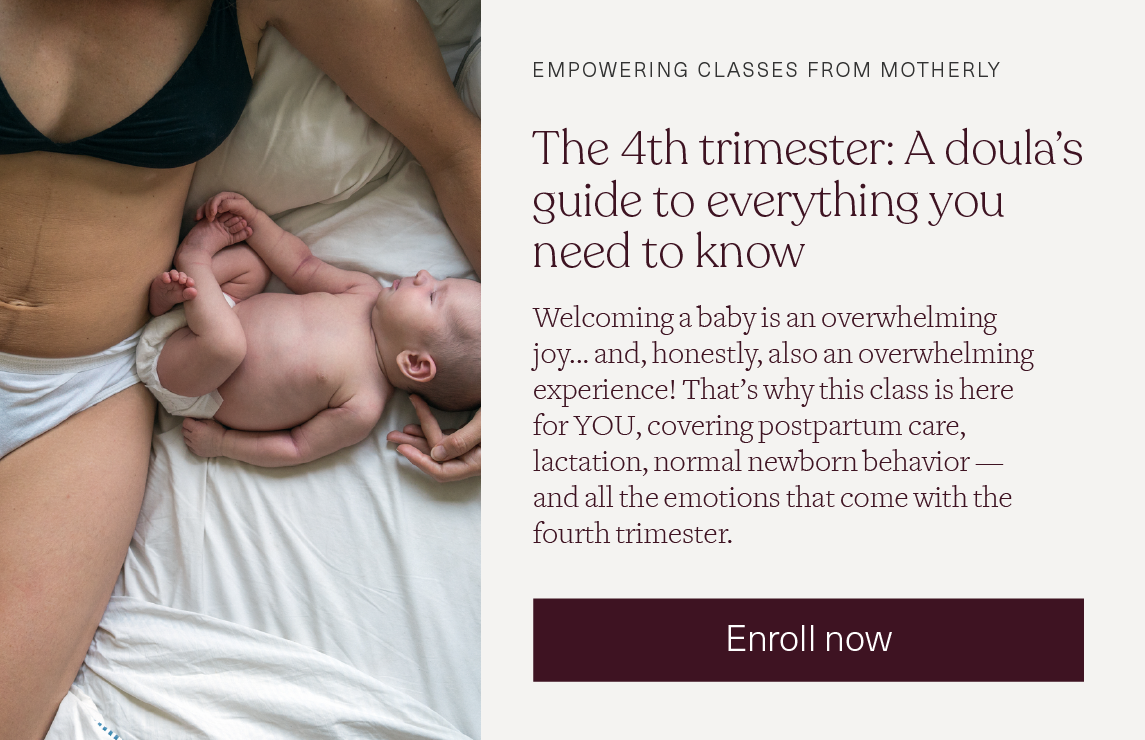3 tips on childbirth recovery from a postpartum doula
1. Assemble a postpartum recovery care team

Shutterstock

As an expert birth and postpartum doula, with over 20 years of experience supporting new parents in the period after giving birth, I want to share with you the secrets that I have learned to help you have as smooth a postpartum recovery period as possible. A variety of factors can impact your postpartum recovery timeline and experience—from the actual birth, to the support you have around you, to your baby’s temperament, and even whether expectations of your childbirth recovery match your reality. While some of these factors are unpredictable, others can be planned for.

Read on to learn about my top tips for childbirth recovery, so that you feel confident entering the fourth trimester
1. Assemble a postpartum recovery care team
As the old adage goes, it takes a village to raise a child. As you plan for your postpartum recovery, make sure you know who you will call on in your ‘village’ as you embark on your journey into parenthood. If you have a care team in place ahead of time, you will have a better idea of how to manage life while healing from childbirth, and while acclimating to the new full-time job of being the parent to a newborn.
While assembling your postpartum recovery care team, you may want to include family, friends, and/or professionals like postpartum doulas and lactation consultants. Make sure you know who will be taking care of the other important parts of your life, including things like food shopping, cooking, household chores, taking care of pets, etc. so that you can focus on your baby and your postpartum recovery.
Related: 5 expert tips for healing your pelvic floor from birth (without leaving home)
Even if you have supportive friends and family who live close by, a postpartum doula is a great person to help you to heal and adjust because their job is to listen and provide emotional and physical recovery support. A postpartum doula will also help you build your newborn parenting confidence by providing baby care and education on diapering, soothing, bathing, grooming, babywearing, and more. Postpartum doulas can also check in on lactation and/or help you bottle feed. They might also help with light baby-related housework, laundry, and even help you with the challenges of getting out of the house with your baby for the first time. Whatever your needs, postpartum doulas are there to support you in the transition to parenthood.
2. Assemble a postpartum recovery kit
Whether your postpartum period includes recovering from a cesarean birth or vaginal birth, and whether you choose to breastfeed or bodyfeed, formula feed, pump, give donor milk, or do some blend, your body will experience great changes and need considerable healing and soothing. Consider creating a postpartum recovery kit stocked with the following items:
- Adult diapers: Especially for vaginal delivery recovery (but even with cesarean recovery) you will likely experience some heavy period-like bleeding, called lochial flow or lochia. Have adult diapers, overnight maxi pads, or postpartum absorbent underwear on hand for extra-absorbency.
- Padsicles: These are menstrual pads which you prepare by soaking in witch hazel and placing them in the freezer. Padsicles can be used to relieve and soothe genital soreness, itchiness, or discomfort of pregnancy and childbirth, including hemorrhoids. Place a frozen pad in your underwear after birth for relief.
- Peri-bottle or squirt bottle: Often provided in the hospital, these bottles are extremely helpful for cleaning after using the bathroom, when you are sore and tender to the touch. They also dilute your urine stream, which reduces stinging and discomfort. While some people like to use warm water in their bottle, others prefer cold. Try both out to see which feels best for you! Simply squeeze the bottle toward your genitals while peeing.
- High-fiber foods or stool softeners: People are often embarrassed to discuss the reality that after having a baby, you may find it challenging to have your first few bowel movements. Since you may experience constipation, or just be hesitant to apply any pressure in that general area, eating soft, easy-to-digest foods like warm broths and high-fiber foods may help ease your first bowel movement. Some people take a stool softener, too—check in with your birth care provider to discuss your best options..
- Nursing needs: If you plan on breastfeeding/chestfeeding, nursing bras, nursing pads, nipple balm, a silicone milk collector, and a high quality pump are not essential, but may be very helpful in the first few months of your lactation journey. Of course, having a great resource to find a lactation consultant can also be instrumental in your feeding journey. Many of these nursing accessories may be covered under your insurance plan or HSA/FSA. Be sure to check with your insurance plan to see what’s available.
3. Make a postpartum priorities plan
While your new baby will quickly become your #1 priority, it is also vital to prioritize “you-care” including nutrition, hydration, self-care, mental health, and your emotional well-being. These can easily be placed at the bottom of your to-do list, but making sure you are running at your best is important for everyone, especially your baby. Consider making a postpartum priority plan for yourself so that you:
- Have warm & nourishing foods at the ready: Stock your postpartum pantry with whole nuts and seeds and nut-butters. It helps to order in bulk and meal prep and freeze foods while you are still pregnant so that you do not have to worry once the baby arrives. If you can, seek out sources of high-quality fat (think: pasture-raised meat, butter, eggs, oily fish like salmon and anchovies, and raw plant oils such as avocado, coconut, and olive). Because of the blood loss and open state of your womb after childbirth, eating and drinking warm foods and beverages can help boost your circulation and optimize your postpartum recovery and healing. Most cultures around the world have traditions around eating warm foods during the postpartum recovery period, such as bone broths, soups, and stews, which stoke your digestive system, helping it to absorb as much nutrition as possible.
- Stay hydrated: There are many teas replete with minerals and vitamins helpful to postpartum like red raspberry leaf, nettle, and red clover teas. Drink teas, soups, and stay hydrated with fruits, lemon water, or coconut water. New parents need to replenish the fluids they lose in birth. Plus, if you are breastfeeding/chestfeeding, you will have another great liquid expenditure, so staying on top of your hydration is key.
- Know how you will get rest: While it can be difficult to “sleep while the baby sleeps,” it is incredibly important to prioritize your own rest. Taking care of a baby is an around-the-clock, 24-hour job and at some point, you have to hit pause. Discuss with your postpartum recovery care team how you want overnight care of you and your baby to look, so that everyone gets the rest they need and deserve.
- Set boundaries with visitors: While friends and family may be eager to meet your new addition, it is important your boundaries are made clear and respected during the postpartum recovery period. Discuss with your care team who is allowed at your birth location and/or your home and if and when you would like to have visitors. Make sure you are clear on your expectations for potential visitors, like considerations around handwashing, masking and holding the baby. It is also perfectly fine to limit visits to 45 or 90 minutes and to only invite visitors who you feel comfortable allowing to do some helpful housework or baby holding.
- Have time for bodywork: Your mind and spirit will start to heal, as your changed/changing body heals. In many cultures, the birth parent receives special massages to aid in postpartum recovery. Family and friends can provide foot rubs, scalp rubs, and other general body massage, or if you would like professional help to elicit mind/body healing, professional massage, acupuncture, osteopathic or chiropractic care, and pelvic floor physical therapy are all excellent options.
Related: Pregnant mom’s rules for meeting her newborn go viral on TikTok—because they’re PERFECT
Both you and your new baby will require special care during this unique time. Assembling both a postpartum recovery care team and a postpartum recovery care kit, as well as making a plan that prioritizes your well-being, are the best ways to organize postpartum life. Instead of feeling overwhelmed to be winging it with little to no direction, you can feel reassured and confident if you plan for your postpartum recovery.
This story is a part of The Motherly Collective contributor network where we showcase the stories, experiences and advice from brands, writers and experts who want to share their perspective with our community. We believe that there is no single story of motherhood, and that every mother's journey is unique. By amplifying each mother's experience and offering expert-driven content, we can support, inform and inspire each other on this incredible journey. If you're interested in contributing to The Motherly Collective please click here.